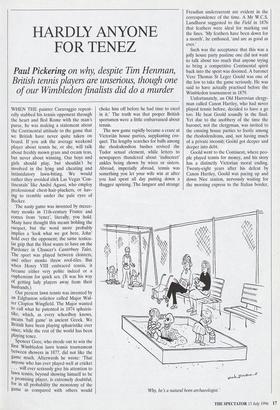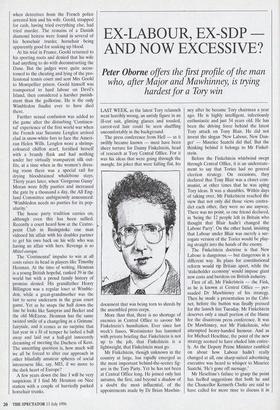HARDLY ANYONE FOR TENEZ
Paul Pickering on why, despite Tim Henman, British tennis players are unserious, though one of our Wimbledon finalists did do a murder
WHEN THE painter Caravaggio repeat- edly stabbed his tennis opponent through the heart and fled Rome with the man's purse, he was making a statement about the Continental attitude to the game that we British have never quite taken on board, If you ask the average weekend player about tennis he, or she, will talk about freshly mown grass and cream teas, but never about winning. Our boys and girls should play, but shouldn't be involved in the lying and cheating and intimidatory lawn-biting. We would rather they avoided slick Las Vegas 'Con- tinentals' like Andre Agassi, who employ professional chest-hair-pluckers, or hav- ing to tremble under the pale eyes of Becker.
The nasty game was invented by merce- nary monks in 11th-century France and comes from 'tenez', literally, you hold. Many have thought this meant holding the racquet, but the word more probably implies a 'look what we got here, John' hold over the opponent; the same testicu- lar grip ffiat the Host wants to have on the Pardoner in Chaucer's Canterbury Tales. The sport was played between cloisters, and other monks threw roof-tiles. But when Henry VIII embraced tennis, it became either very polite indeed or a euphemism for quick sex. (It was his way of getting lady players away from their husbands.) Our present lawn tennis was invented by an Edgbaston solicitor called Major Wal- ter Clopfon Wingfield. The Major wanted to call what he patented in 1874 sphairis- tike, which, as every schoolboy knows, means 'ball game' in ancient Greek. We British have been playing sphairistike ever since, while the rest of the world has been playing tenez.
Spencer Gore, who strode out to win the first Wimbledon lawn 'tennis tournament between showers in 1877, did not like the game much. Afterwards he wrote; 'That anyone who has ever played well at cricket • . will ever seriously give his attention to lawn tennis, beyond showing himself to be a promising player, is extremely doubtful; for in all probability the monotony of the game as compared with others would choke him off before he had time to excel in it.' The truth was that proper British sportsmen were a little embarrassed about tennis.
The new game rapidly became a craze at Victorian house parties, supplanting cro- quet. The lengthy searches for balls among the rhododendron bushes revived the Tudor sexual element, while letters to newspapers thundered about 'indiscreet' ankles being shown by wives or sisters. Abroad, imperially abroad, tennis was something you let your wife win at after you had spent all day putting down a thuggee uprising. The languor and strange Freudian undercurrent are evident in the correspondence of the time. A Mr W.C.S. Lundhurst suggested to the Field in 1876 that feathers were ideal for marking out the lines. 'My feathers have been down for a month', he enthused, 'and are as good as ever.'
Such was the acceptance that this was a jolly house party pastime one did not want to talk about too much that anyone trying to bring a competitive Continental spirit back into the sport was doomed. A baronet Vere Thomas St Leger Goold was one of the few to take the game seriously. He was said to have actually practised before the Wimbledon tournament in 1879.
Unfortunately, an Old Harrovian clergy- man called Canon Hartley, who had never played tennis before, decided to have a go too. He beat Goold soundly in the final. Yet due to the snobbery of the time the baronet, not the clergyman, was invited to the ensuing house parties to footle among the rhododendrons, and, not having much of a private income, GoOld got deeper and deeper into debt.
Goold went to the Continent, where peo- ple played tennis for money, and his story has a distinctly Victorian moral ending. Twenty-eight years after his defeat by Canon Hartley, Goold was pacing up and down Nice station, nervously waiting for the morning express to the Italian border, 'Why, he's a natural born archaeologist.' when detectives from the French police arrested him and his wife. Goold, strapped for cash, having tried everything else, had tried murder. The remains of a Danish diamond heiress were found in several of his horsehair trunks; horsehair being apparently good for soaking up blood, At his trial in France, Goold returned to his sporting roots and denied that his wife had anything to do with deconstructing the Dane. But the judges were quite accus- tomed to the cheating and lying of the pro- fessional tennis court and sent Mrs Goold to Montpellier prison. Goold himself was transported to hard labour on Devil's Island, then considered a harsher punish- ment than the guillotine. He is the only Wimbledon finalist ever to have died there.
Further sexual confusion was added to the game after the disturbing 'Continen- tal' experience of the first world war when the French star Suzanne Lenglen arrived clad in snow-white furs to face the Ameri- can Helen Wills. Lenglen wore a shrimp- coloured chiffon scarf, fortified herself with a brandy flask and had nothing under her virtually transparent silk out- fits, at a time when in the women's dress- ing room there was a special rail for drying bloodstained whalebone stays. Thirty years later, when 'Gorgeous Gussy' Moran wore frilly panties and increased the gate by a thousand a day, the All Eng- land Committee ambiguously announced: 'Wimbledon needs no panties for its pop- ularity.'
The house party tradition carries on, although even this has been sullied. Recently a court heard how at the Centre- point Club in Basingstoke one man videoed his affair with his doubles partner to get his own back on his wife who was having an affair with hers. Revenge is so Mittel-europa.
The 'Continental' impulse to win at all costs raises its head in players like Timothy Henman. At the time of writing, Henman is a young British hopeful, ranked 39 in the world but with a proud family history of promise denied. His grandfather Henry Billington was a regular loser at Wimble- don, while a great-grandmother was the last to serve underarm in the grass court game. Yet as he snaps the ball down the line he looks like Sampras and Becker and the old McEnroe. Henman has the same twisted smile of a changeling in a Grimms' fairytale, and it comes as no surprise that last year in a fit of temper he lashed a ball away and laid out a ball-girl innocently dreaming of meeting the Duchess of Kent. The unsettling question is, how much will we all be forced to alter our approach in other blissfully amateur spheres of social intercourse like, say, MI5, if we move to the dark heart of Europe?
A few years down the line I will be very suspicious if I find Mr Henman on Nice station with a couple of hurriedly packed horsehair trunks.



































































 Previous page
Previous page